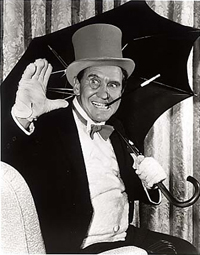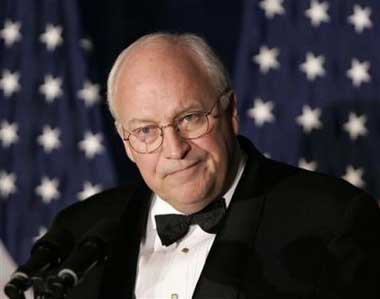Citizen Cheney, or, Wah! Err! Um! Wah!
Yes, the Cheney-The Penguin comparisons have grown so commonplace as to almost be tiresome. On the other hand, perhaps the longevity of the comparison is an indication of the fact that it rings so true. If its a tiresome joke, its only because it's so easy. In a Penguin look-alike contest, Cheney would probably beat out FDR even sans cigarette holder. But it is a pretty close race:
My take on it: BYU's decision accept Cheney's self-invite to speak isn't the end of civilization as we know it, but it probably was ill-advised. Were BYU an average run-of-the-mill independent private school, there wouldn't really be anything wrong with it beyond the bare fact that Cheney is unpopular and annoying. But BYU is not an average private school; it is the flagship educational institution of a major religious organization with a declared commitment to political neutrality. I don't think BYU in the abstract should refrain from inviting political officials, even controversial ones, to speak on campus. But the question cannot be considered in the abstract.
1. This is not just a speech, this is commencement. Commencement ought to be apolitical. Anyone who thinks that Cheney will not use commencement as a political platform is fooling himself.
2. Commencement gives the impression that the University endorses the speaker. Speaking at a forum is speaking to the University community, but speaking at commencement is in most people's minds, speaking to the graduates on behalf of the University.
3. This comes at a time when only one other campus has allowed Cheney to speak at commencement, and when the Administration's approval ratings are beyond abysmal. In this environment,
 accepting Cheney's self-invite could easily be construed, right or wrong, as some kind of implicit endorsement.
accepting Cheney's self-invite could easily be construed, right or wrong, as some kind of implicit endorsement.4. BYU, despite its efforts to be even-handed, has a pattern of inviting more conservative speakers to campus. Inviting Cheney only reinforces this pattern and in doing so, undermines the Church's effort to be politically neutral.
It has been suggested that inviting Tom Lantos to speak a few years ago balances inviting Cheney. The comparison is flawed for several reasons. First, Lantos' wife is a Mormon; it is not unusual that BYU would invite someone with ties to the LDS community, regardless of politics. (The same is true about Harry Reid, who spoke at BYU Law commencement a few years ago). Second, Lantos himself is a holocaust survivor. Someone with that kind of experience is a good speaker to have regardless of politics. Third, Lantos is only one of hundreds of members of Congress. Cheney, on the other hand, is the number two of a co-equal branch of government. While it is true that democrats have spoken on campus, to get one comparable to Cheney in national profile and party stature you have to go all the way back to Bobby Kennedy's speech at the Smith Fieldhouse in 1968; and he didn't even speak at commencement. (On the other hand, that was during the Wilkinson years; the fact that he even got on campus is kind of a big deal).
I think part of the issue here is that the BYU administration sees the world through Provo-colored lenses. In that worldview, there's nothing partisan or that even appears partisan about BYU's choice of speakers. But BYU is not a regional school anymore, it is a national school, and it represents an international church. From a national or international perspective, BYU's choice of speakers tends to lean to the right.
Let me be clear: I don't think BYU or any other school has a legal or an ethical obligation per se to be even-handed in its speakers. But if the First Presidency is going to continue to insist on partisan neutrality, any appearance of a lack of neutrality in BYU is damaging. This is even more so now that media attention is shifting towards Mormons for a variety of reasons (Romney, the PBS documentary, the Mountain Meadows Massacre movie, Kyle Sampson, etc.).
However, the fact that BYU has invited Cheney to speak at commencement and the backlash against that decision have put the administration on their toes. This could mean that BYU will make a greater effort to invite political figures from both sides. At least one of my old profs has said that he will donate nothing to the Alumni organization until BYU invites the anti-Cheney to campus.
Further Reading:
Provo Daily Herald: "Opponents Organize Against Cheney Visit"
CNN.com: "Students peacefully protest Cheney's upcoming appearance at BYU"
A blog with pictures of the April 4th demonstration






2 comments:
You forgot to mention that Lynne Cheney’s has Mormon ancestors, so nothing political there.
http://www.statesman.com/blogs/content/shared-blogs/washington/washington/entries/2007/04/18/lynne_cheneys_m.html#comments
I think if there weren't the war going on it wouldnt be as big of a deal.
Warren, you should learn to use html to make links. As it is, you have to highlight it and put it into your browser, but you can't highlight it all because its too long to be displayed properly.
I completely agree with you that it wouldn't be as big a deal as it is without the war. But it isn't just the war, its also the fact that his office is under investigation for the whole Plame thing, and the fact that there is pretty much a national consensus that this administration has really screwed things up (which I suppose, does get back to the war). I guess it isn't the fact that there's a war going on, but the fact that 4/5 of Americans believe the war is being wrongly fought. In this particular environment, the average perception is going to be that if you aren't against him, you're with him. Obviously, that's not good when you represent a church that tries so hard to be apolitical.
But even as it is, I don't think I consider it a big deal. I just think it was probably not a good idea.
Post a Comment